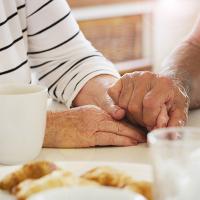
Water is essential for bladder health. Fresh, clean water offers a range of benefits to your health and is an excellent way to get much-needed nutrients with little to no calories.
Studies suggest the average, healthy person living in a temperate climate should be drinking an eight-ounce glass of water six to eight times a day1. Water is also found in many foods such as vegetables and fruits, so depending on how much water you consume from your diet, the number of recommended glasses per day will vary. Underlying health conditions can also influence how much liquid you should be drinking. As a rule of thumb, consult with your primary health care provider around any changes you plan to make to your diet, including how much water you should be drinking every day.
- Water Consumption and Bladder Cancer
- Effects of Dehydration on the Bladder
- How to Prevent Dehydration
Water Consumption and Bladder Cancer
The American Cancer Society states that those who drink a lot of fluids, especially water, each day tend to have lower rates of bladder cancer2. The theory is that drinking a lot of water allows your body to better break down harmful toxins and potential carcinogens and flush them out with bodily waste. Frequent water consumption also leads to frequent urination, giving potentially harmful cells less time in the body.
Effects of Dehydration on the Bladder
Dehydration occurs when the body expels more fluids than it is taking in, either through a lack or shortage of water or an activity or condition that accelerates that expulsion. Dehydration and bladder pain often go hand in hand, resulting in unpleasant conditions, such as:
- Urinary Tract Infections: Concentrated urine can lead to urinary tract infections (UTI), which can become severe enough to warrant antibiotics. Though less severe UTIs usually clear up on their own, they can be extremely uncomfortable, with symptoms such as a burning pain when urinating, abdominal pain, and the feeling that you're never able to fully empty your bladder.
- Kidney Stones or Infection: Kidney stones and kidney infections are two other potential effects of inadequate water consumption. In worst-case scenarios, kidney failure is also a possibility.
- Concentrated Urine: Concentrated urine consists of more solutes — dissolved particles, like sugars, which should be expelled as waste — and less water, which can end up becoming an irritant for your bladder. Concentrated urine can also make you feel like you desperately need to urinate or lead to urinary incontinence.

How to Prevent Dehydration
The best way to prevent dehydration is to ensure you're consuming the recommended amount of water throughout the day (for a healthy adult living in a temperate climate, an eight-ounce glass of water six to eight times a day1) both by drinking liquids directly or eating foods like fruits and vegetables that contain a high volume of water. Cutting down on alcoholic drinks or at least balancing your alcohol intake with water can also help as alcohol is a diuretic that encourages the expulsion of fluids, including water, from blood throughout your renal system.
Actions or physical states that may increase your likelihood of becoming dehydrated are another factor to consider. For example, if you're exercising you're going to expel a lot of fluids in the form of sweat, so it's crucial to make sure you're drinking plenty of water before, during, and after to maintain a healthy amount of fluids. Similarly, if you're sick and prone to vomiting, fever, or diarrhea, it's a good idea to make sure you're drinking plenty of fluids for the same reason.
Sweating, vomiting and diarrhea can lead to further dehydration through the loss of electrolytes. Electrolytes are chemicals that regulate nerve and muscle function, hydrate the body, balance blood acidity and pressure, and help rebuild damaged tissue. Many sports drinks are formulated to replace electrolytes so provide a useful means of rehydrating during exercise or when you’re unwell.

Browse Our Blog For More Bladder Health and Bladder Cancer Resources
We hope you enjoyed this post. For more articles linked to Bladder Health and Bladder Cancer, we invite you to browse the Cxbladder blog.






